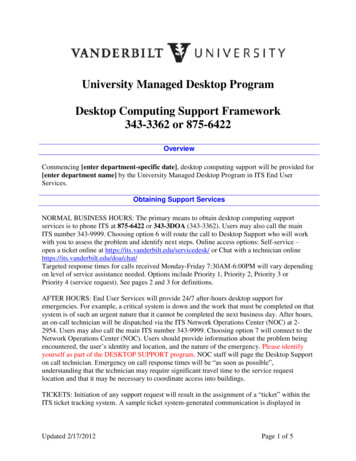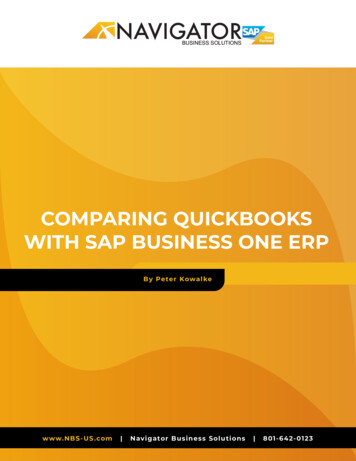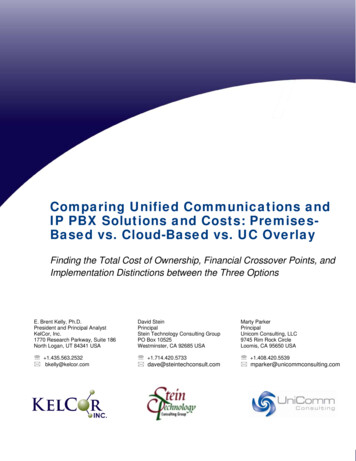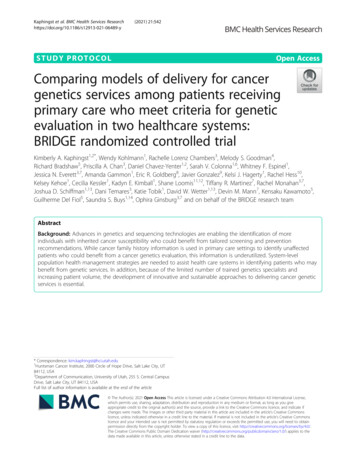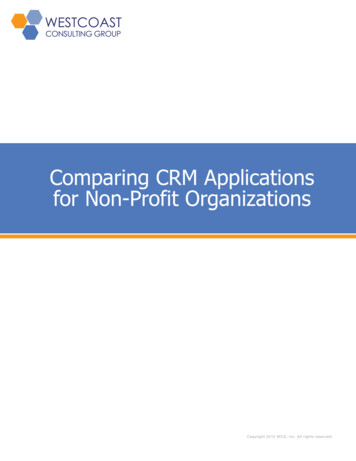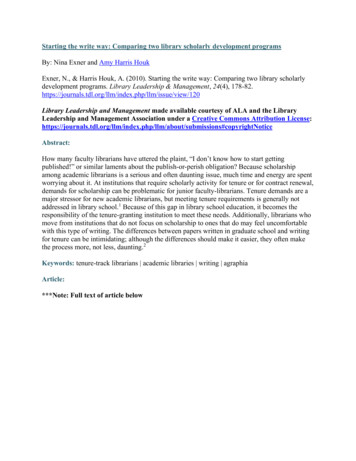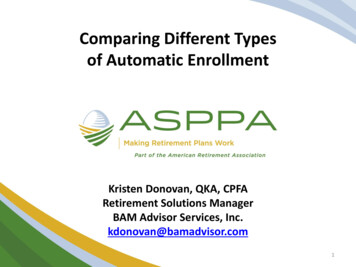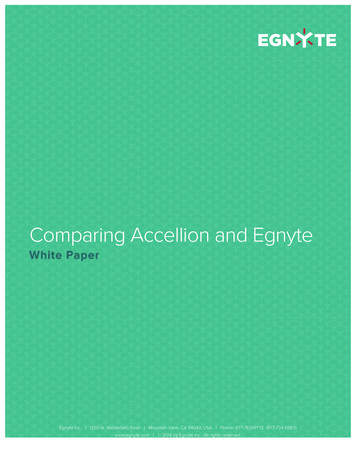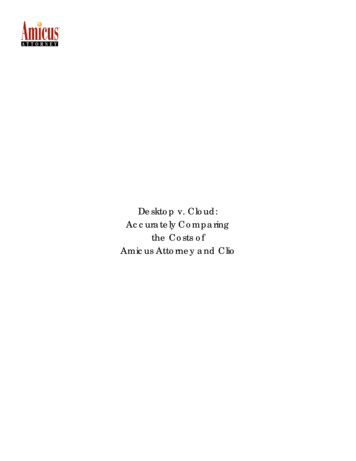
Transcription
Desktop v. Cloud:Accurately Comparingthe Costs ofAmicus Attorney and Clio
Desktop v. Cloud:Accurately Comparing the Costs of Amicus Attorney and ClioIntroductionRecently a provider of cloud‐based legal practice management solutions publicly compared the total cost of ownershipof their product to that of Amicus Attorney. Unfortunately the cost breakdown they showed for Amicus Attorney, for 2attorneys and 2 support staff over a three year period, was inaccurately represented and inflated by more than 100%.The purpose of this whitepaper is to set the record straight and show an accurate comparison of total cost of ownershipfor Amicus Attorney’s desktop solution and a typical Clio cloud based solution.A comparison of the Total Cost of Ownership between Amicus and Clio legal practice management solutions does notpreclude the fact that the functionality of the two solutions is dramatically different. Not only is Amicus Attorney’s TOCmore cost‐effective than Clio’s, Amicus works better and is far more feature‐rich. The advantage of Amicus Attorney’ssuperior functionality is that it reduces all of the burden and complexity of management processes so that you canspend more of your time practicing law and billing for it.When it comes to evaluating the real advantages of different solutions, it’s important to have an understanding of thefeatures you are going to need to streamline your legal practice and generate more revenue. After probing deeper intothe differences in functionality, it is clear that Amicus Attorney features related to performance, integration, timemanagement, team utilities, calendar functionality, appointment detail and many other areas are consistently morerobust than Clio features related to the same areas. For a detailed comparison of Amicus Attorney features and Cliofeatures, see our whitepaper All Practice Management Solutions Are Not Created Equal.What also impacts a discussion on costs is that following the three year period referred to in this whitepaper, the AmicusAttorney practice management solution will keep working long after it’s been paid for. But the Clio solution will nolonger work unless monthly subscription payments are made, holding attorneys hostage to making continual payments.If we were to continue the cost comparison for an additional two years, the TOC in the Clio scenario would be up to 8,880.00 by year five while for Amicus it would be only 5,796.00. This includes the optional 820.00 in yearly Amicusmaintenance costs that ensure automatic yearly upgrades as well as unlimited IT support.In this whitepaper, we begin by taking the exact comparison chart that was presented in Clio’s whitepaper, and circlingthe inaccuracies in the costs presented for Amicus Attorney. Then, we accurately disclose the Total Cost of Ownershipfor Amicus Attorney in the scenario they used for comparison ‐ two attorneys and two support staff, over a three yeartimeline. Finally we once again compare the total cost of ownership of the two products using their comparison chart,followed by other cost considerations to take into account.Not only is Amicus Attorney more cost effective than Clio, it keeps working for many years beyond the three‐year point ‐whereas Clio’s won’t work unless more payments are made. Since the Amicus solution has more robust functionalitythan the Clio solution, attorneys are paying more for Clio while actually getting less.
Exact Comparison Chart Presented in Clio’s WhitepaperThe chart below was presented in Clio’s whitepaper. The circles items in red indicate the inaccurate costs presented byClio for Amicus Attorney.
An Accurate Disclosure of the Total Cost of Ownership for Amicus AttorneySmall Firm EditionFor a two‐lawyer and two‐assistant scenario we wouldprovide our Amicus Small Firm product.Amicus Attorney Small Firm Edition costs 499 for thefirst license and 399 for each additional license,bringing the total cost of licenses for two attorneysand two support staff to 1,696.Amicus Attorney’s Small Firm Edition does not requirea server since it works in a peer to peer environment.Amicus Small Firm does not require a mobile server, aWindows Server 2008 License, or a Mobile ServerLicense. There is no CD required as the software isavailable for download. It does not require installationeither, since Amicus Attorney provides that at no costduring the 30‐day free trial period.Configuration and setup of Amicus Attorney’s SmallFirm Edition is very easy. Learning how to use andbenefit from the program is easily mastered as well,since its intuitive way of working is extremely lawyer‐friendly. Amicus is known as a program that has beenbuilt by lawyers for lawyers.Thousands of firms maintain and use Amicus SmallFirm Edition without the assistance of outside ITsupport. Firms that want to receive unlimited technicalsupport as well as all software upgrades, enroll in theAmicus Maintenance Plan. Amicus Maintenance forthe first license is 280 and for additional licenses is 180. In a two attorney and two support staffscenario, Amicus Maintenance is 820 per year. This isthe only cost the firm needs to optionally incur in yearstwo and three.That means that the Total Cost of Ownership of Amicus Attorney Small Firm Edition is 2,516 over one year, 3,336 overtwo years and 4,156 over three years.
Comparison of the Total Cost of Ownership for 2 Attorneys 2 Support StaffWhat is Outlook Integration in a Practice Management System Worth in Termsof Dollars?Amicus Attorney’s Outlook integration helps attorneys to both capture and bill for every minute that they’ve spent doingwork by email. This is one of the many features of Amicus Attorney that is not available in Clio.A two‐lawyer, two‐assistant firm billing in 0.1 of an hour at 200/hour ‐ that captures just two additional emails per dayusing Amicus Attorney’s Outlook integration, that they otherwise would not have billed for – would increase their dailybillings for each lawyer by 40.00. This would increase their annual billings by 20,000.The ROI for Amicus solutions is also quickly achieved. With the cost of 4 Amicus Small Firm Edition licenses totaling 1,696.00, Amicus Attorney would pay for itself in 21 days. You can use the ROI calculator on Amicus Attorney’s websiteto calculate the exact ROI for your own firm.
ConclusionWhen analyzing the total cost of ownership of Amicus and Clio, the “not comparing apples‐to‐apples” analogy is two‐fold. The different acquisition models associated with desktop‐based solutions and Software‐as‐a‐Service (SaaS)solutions are frequently discussed in the legal profession. But the difference between Amicus and Clio solutions alsogoes beyond the costs of up‐front purchase with optional maintenance v. monthly subscription fees. The difference inthe two solutions is largely a difference in functionality.On a three year basis, the Total Cost of Ownership of the Amicus Attorney Small Firm Edition software product is moreeconomical than a typical Clio web‐based solution. This includes all acquisition costs, initialization costs and annualizedoperating costs. If extended to a five‐year basis, this cost difference grows astronomically.Amicus Attorney has features that Clio doesn’t offer and it works better. It is the more economical legal practicemanagement solution over three years, even with additional accounting and maintenance components.
The ROI for Amicus solutions is also quickly achieved. With the cost of 4 Amicus Small Firm Edition licenses totaling 1,696.00, Amicus Attorney would pay for itself in 21 days. You can use the ROI calculator on Amicus Attorney’s website to ca
